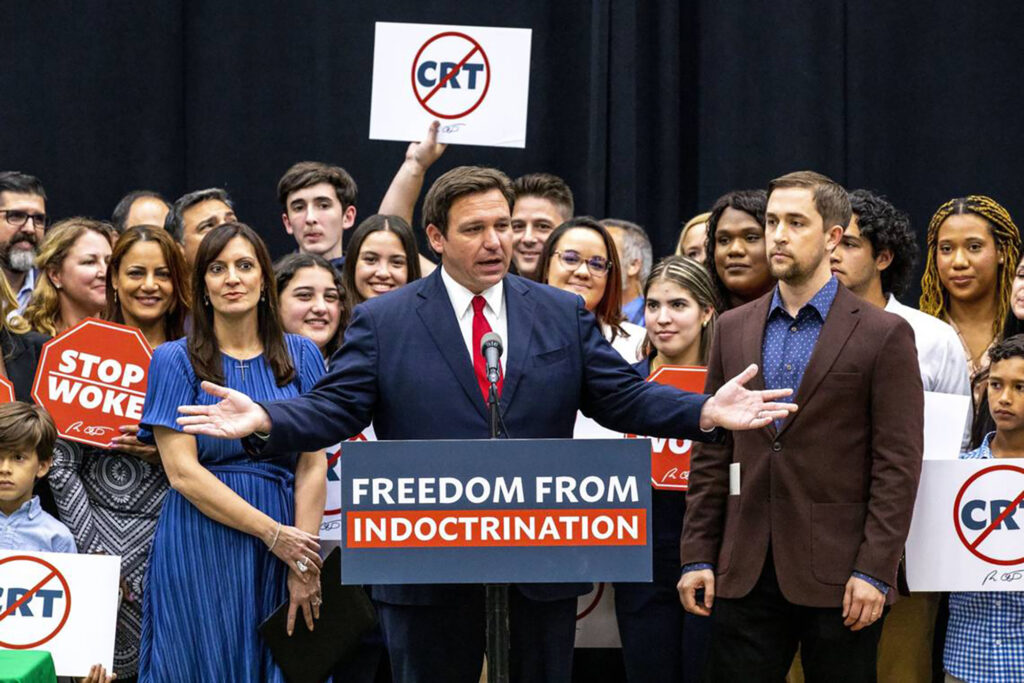
In 1994, Florida took a groundbreaking step in secondary education by being the first U.S. state to pass a law requiring the teaching of African American history in schools. In 2023, many educators say, Florida took a big step backward.
The Florida Department of Education on Jan. 12 rejected a new AP African American Studies course produced by the College Board, one long under development and already in a pilot stage in 60 high schools across the country. The AP African American Studies curriculum, said the state agency, “significantly lacks educational value,” citing as evidence the course’s treatment of Black Queer studies, intersectionality, the Black Lives Matter Movement, Black feminist literary thought, the reparations movement and more. Florida Gov. Ron DeSantis, who in 2022 signed the “Stop W.O.K.E. Law” restricting the teaching of race relations and diversity, said those subjects reflect a “political agenda.”
Florida’s decision was severely criticized in U.S. academia, especially by Black American professors and administrators. Some 800 Black American scholars and others signed an open letter castigating DeSantis for attempting to “delegitimize the AP’s pilot curriculum.” Keisha Chin Goosby, clinical assistant professor of education in the LMU School of Education, sees the state’s decision as partly political.
“In order to distract the public from the real issues that impact students,” Goosby explains, “we find ourselves in a debate about teaching children about race and racism. … This campaign was deliberately started to ensure that we continue to fight each other while those in power are not held accountable for what really matters for the well-being and advancement of all students.”
“This is not just about Florida’s opposition to teaching aspects of Black history, but about the country’s opposition to teaching aspects of Black history,” Goosby says.
But the debate also has deeper implications for teaching and understanding U.S. history, Goosby says. “This is not just about Florida’s opposition to teaching aspects of Black history, but about the country’s opposition to teaching aspects of Black history.”
Emelyn A. de la Peña, LMU vice president for Diversity, Equity and Inclusion, says it’s no surprise that educating young people about the history of racism is contested ground. She has taught and worked in university settings for 27 years, including stints at Stanford University, Harvard University and Washington University in St. Louis. Education, she says, long has been a battleground, over the issue of justice and equal rights in the United States.
“How we teach our students and how we teach them to think critically has always been up for discussion and debate,” she says. “What’s different today is the discussion has become politicized, and politicized along party lines.”
Critics of the revised curriculum have said that relegating recent events in U.S. Black history severs the past from its impact on the present. de la Peña is concerned that the result will be a curriculum that is historical in nature but fails to examine the impact of that history’s legacy has today. “Does it position history as static and over?” she asks.
“How we teach our students and how we teach them to think critically has always been up for discussion and debate,” de la Peña says.
Marne Campbell, associate professor and chair of the Department of African American Studies in the LMU Bellarmine College of Liberal Arts, says teaching Black history when certain chunks of it are deemed illegitimate speaks volumes and has consequences. Among the courses she teaches to LMU undergraduates are African American history and Introduction to African American Studies.
Campbell says that by rejecting Black America’s recent history, Florida’s decision is an exercise in picking and choosing in order to tell a history that appears less critical of the United States. The Civil Rights era protests, as distinct from the Black Lives Matter movement, seem more acceptable than recent demonstrations, she suggests, because they now are perceived, incorrectly, as less confrontational.
Campbell says the impact on students is significant: They are prevented from becoming critical thinkers. “When we take away their ability to decide, we take away their ability to create the world in which they want to live and leave them with a world that has been dictated to them.” Also, she notes, the message, in the end, is “that Black lives, indeed, don’t matter.”
For de la Peña, discussing the history of race or of a people in this country in a way that connects the legacies of slavery and white supremacy to what is happening today is crucial, and directly related to the mission of a Jesuit, Catholic university.
“Social justice is not a new topic in Catholic education,” de la Peña explains. “To think about how we talk about the marginalized, how harm has been done, how to repair harm that has been done — that’s very much part of our Catholic social teaching and very much part of our Ignatian pedagogy. … I’m really happy to work at an institution that is looking at the question of what do we mean when we talk about diversity and are we doing it with an anti-racist lens.”
Goosby believes efforts to restrict and contain the teaching of racism and Black American history in higher education will ultimately be futile. But those efforts, she says, will impact students and their education nonetheless.“The fact that we are still debating the what, how and why the Black and African American experiences are important in U.S. history is the evidence of the long-term effect,” Goosby says.
Joseph Wakelee-Lynch is editor of LMU Magazine.
